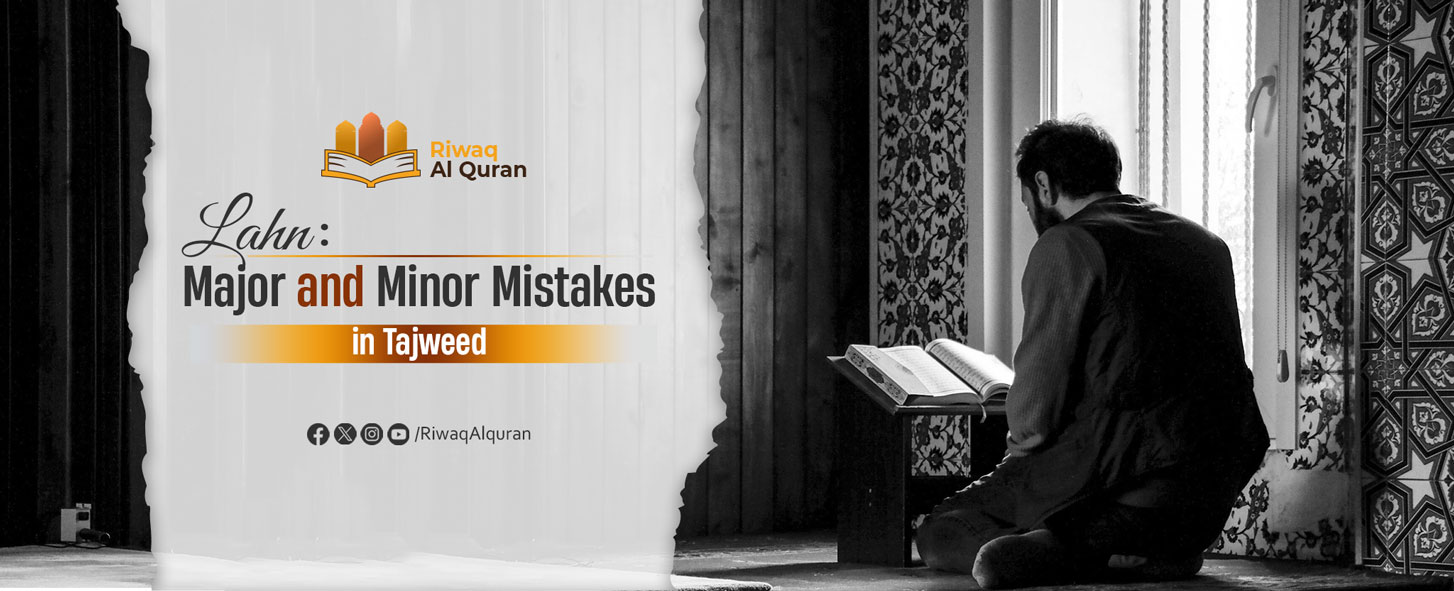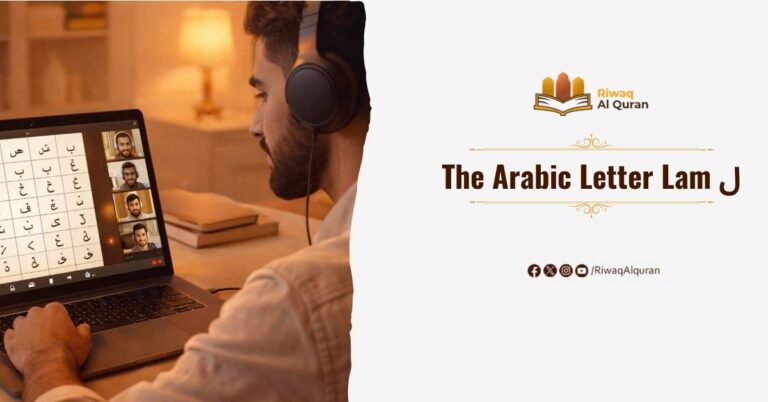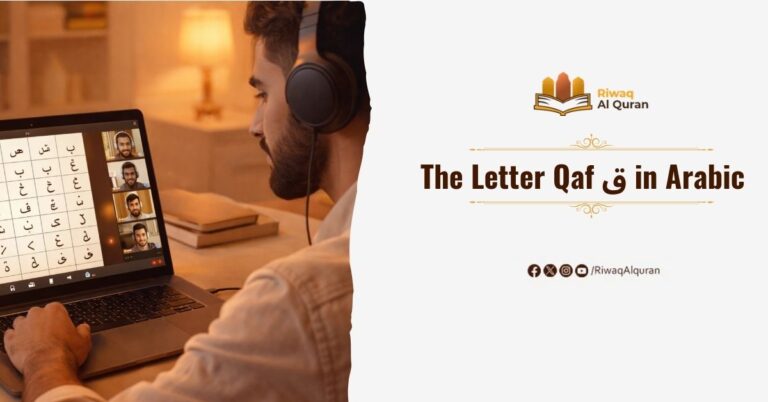Lahn in Tajweed refers to major or minor mistakes made in the recitation of the Quran. These mistakes can affect the pronunciation or even the meaning of some words of the Quran. Muslims are required to avoid all kinds of Lahn when reciting the Quran.
In this article, we will explore the meaning of Lahn (لحن) in Arabic as well as the definition of Lahn in Tajweed. Also, we will examine the main types of Lahn in Tajweed: Lahn Jali (اللحن الجلي) and Lahn Khafi (اللحن الخفي). We will also show some examples of each of these types from the Quran.
Then, we will see the ruling of Lahn in Islam: Is it a prayer breaker? Is it a sin? What do Muslim scholars say about it? We will also explore some practical ways that help get rid of Lahn in Tajweed.
Table of Contents
Lahn Meaning In Arabic
Linguistically, Lahn (لحن) in Arabic means a deviation from correctness. The term Lahn is used to describe speaking in opposition to the proper rules of grammar and pronunciation of the language. The word “Lahn” refers to “agrammaticality” or “making mistakes in the Arabic spoken language”.
Historically, inhabitants of the Arab Peninsula (the Arabs) mastered Arabic perfectly. There was no space whatsoever for Lahn among them. Arabs even used to compete in composing long poems on the spot. Arabic was like a soft dough in their hands, that they could manipulate very easily as they wished. Even young Arab children knew by nature how to speak perfect standard Arabic.
However, when Islam expanded and non-Arabs began to embrace Islam, the Arabic tongue mingled with other languages, and hence the Arabic faculty got weaker and weaker. That’s why the science of Tajweed was established later on so that Arab and non-Arab Muslims could read the Quran properly as it was revealed to Prophet Muhammad (peace be upon him).
What Is Lahn (لحن) In Tajweed?
Lahn in Tajweed is to commit errors in the pronunciation of the Quranic text, affecting the accepted norms of recitation and rules of Tajweed. These can take so many forms. For example, it can be mispronunciation of letters, incorrect Waqf and Ibtida (الوقف والابتداء), incorrect Madd, etc. Below we will explore the types of Lahn.
What Are The Types Of Lahn In Tajweed?
There are two main types of Lahn in Tajweed. These are Lahn Jali (اللحن الجلي) and Lahn Khafi (اللحن الخفي). Let’s see how they are different from each other and examine some examples of each of them.
Lahn Jali And Lahn Khafi
Lahn Jali and Lahn Khafi are the two types that Muslim scholars of Tajweed recognize when referring to Lahn in Tajweed. Lahn in Tajweed is divided into Lahn Jali (clear errors) and Lahn Khafi (subtle errors).
Lahn Jali involves obvious mistakes that alter the meaning or structure of Quranic words, such as mispronouncing “لَتُسْـَٔلُنَّ” as “لَا تُسْـَٔلُنَّ”, which changes the verse’s meaning entirely. These errors are noticeable by both scholars and laypeople.
Lahn Khafi refers to subtle mistakes in applying Tajweed rules, like improper Madd or Idgham, which do not alter the word’s meaning but affect recitation quality. For example, shortening the required six Harakat in “وَلَا ٱلضَّآلِّينَ” in Surah Al-Fatiha is Lahn Khafi, detectable only by experts. Both types emphasize the importance of proper Tajweed.
Let’s explore them in some detail.
Lahn Jali (اللحن الجلي):
Lahn Jali is the first type of Lahn in Tajweed. It is very important to know what this term refers to as it has a significant bad impact on a Muslim’s recitation of the Quran.
What Is The Meaning Of Lahn Jali? [What Is Lahn Jali?]
Lahn Jali means manifest mispronunciation of the Quranic text. It alters the structure or the meaning of the word. It is called Jali (manifest) as it can easily be observed by scholars of the Arabic language and the layman who is not an expert in the language. So it is a clear mistake recognizable by scholars of recitation and the general public.
These mistakes can include mispronouncing letters, pausing in the incorrect places, or even reciting verses in a fashion that deviates from accepted Tajweed rules. These mistakes have the power to drastically change how the Quranic verses are understood and conceived.
An Example Of Lahn Jali From The Quran:
It is considered a Lahn Jali to say “لَا تُسْـَٔلُنَّ” instead of “لَتُسْـَٔلُنَّ” in the following verse:
“ثُمَّ لَتُسْـَٔلُنَّ يَوْمَئِذٍ عَنِ ٱلنَّعِيمِ”
[Then, on that Day, you will definitely be questioned about ˹your worldly˺ pleasures.]
Here, if the reciter adds an alf (ا) and reads “لا تسألن” [you will not be questioned] instead of “لتسألن” [you will definitely be questioned], then they are making a Lahn Jali as they produce the complete opposite of the intended meaning of the verse.


Lahn Khafi (اللحن الخفي):
Lahn Khafi is the second type of Lahn in Tajweed. It is also important to know what it means because it has a bad impact on a Muslim’s recitation of the Quran, although it is not as bad as Lahn Jali.
What Is The Meaning Of Lahn Khafi? [What Is Lahn Khafi?]
Lahn Khafi means making an error in reciting the Quranic text, but without altering the structure of the word. It is called Khafi (subtle) as it can only be caught by scholars of Arabic language and Tajweed rules, while it remains “hidden” from the layman. In general, it has more to do with Tajweed rules such as Madd, Izhar, Idgham, Iqlab, etc.
An Example Of Lahn Khafi From The Quran:
It is considered a Lahn Khafi to say “وَلَا ٱلضَّآلِّينَ” with only 2 or 4 Harakat of Madd in the “ا” sound after “ض”, instead of “وَلَا ٱلضَّآلِّينَ” with the correct 6 Harakat of Madd, in the following verse:
“صِرَٰطَ ٱلَّذِينَ أَنْعَمْتَ عَلَيْهِمْ غَيْرِ ٱلْمَغْضُوبِ عَلَيْهِمْ وَلَا ٱلضَّآلِّينَ“
[the Path of those You have blessed—not those You are displeased with, or those who are astray.]
Here, if the reader of this verse does not make the full 6 Harakat of Madd in the “ا” sound of “الضالين”, he/she is making a Lahn Khafi. This is because the structure and meaning of the word are not changed, but the Tajweed rule of Madd is broken [the Tajweed rule here is heavy mandatory Madd (مد لازم مثّقل) that is equal to 6 Harakat].
Experience Riwaq Al Quran Classes
Watch real moments from our live sessions at Riwaq Al Quran and see how we bring learning to life. These clips highlight our interactive, student-focused approach designed to keep learners engaged, motivated, and actively involved in every step of their educational journey.
Major And Minor Mistakes In Tajweed
Lahn in Tajweed has two subtypes: Major Lahn and Minor Lahn. Let’s explore how they are differentiated from one another along with examples of them.
1- Major Lahn (Major Mistakes):
Major Lahn refers to errors in pronunciation that give the word or phrase a totally wrong meaning. Let’s see an example of this.
Example:
If you use Dammah (ُ) or Kasra (ِ) in place of Fatha (َ) at the end of the word “أَنْعَمْتَ” in the verse “صِرَٰطَ ٱلَّذِينَ أَنْعَمْتَ عَلَيْهِمْ”, this is called a Major Lahn. This is because using Dammah means that the doer is yourself and using Kasra means that the doer is a female, while the doer of this action here is Allah. So only Fatha must be pronounced at the end of this verb. Otherwise, the whole meaning changes.
2- Minor Lahn (Minor Mistakes):
Minor Lahn refers to errors in pronunciation that do not give the word or phrase a wrong meaning. Let’s see an example.
Example:
You are committing a Minor Lahn, if you use Dammah (ُ) or Fatha (َ) in place of Kasra (ِ) at the end of the word “لله” when reciting:
“ٱلْحَمْدُ لِلَّهِ رَبِّ ٱلْعَـٰلَمِينَ”
[All praise is for Allah—Lord of all worlds]
Why is this considered a Minor Lahn? Because while the pronunciation of the word changes, the meaning is maintained.
Does Lahn In Tajweed Break The Prayer?
Lahn or errors in reciting the Quran during prayer can invalidate the prayer if it changes the meaning in Al-Fatiha Chapter only. For example, if one pronounces the “ka” sound in “إِيَّاكَ” with Kasra (ِ) in place of Fatha (َ), the prayer is invalid, if this is done intentionally; and the recitation must be corrected, if unintentional.
The reason here is that adding Kasra at the end of the word “إِيَّاكَ” makes the addressee a female which is considered a Major Lahn as it completely changes the meaning of the verse. So significant errors in meaning affect the validity of prayer if they occur in Al-Fatiha Chapter.
However, minor mistakes, such as excessively making Madd in the word “ٱلْعَـٰلَمِينَ”, do not change the meaning and thus do not break the prayer, especially if they are indeliberate. This also applies to making incorrect Ghunnah, Ikhfa, etc. while praying.
However, there is an exception for new Muslims who revert to Islam and who speak languages other than Arabic. Their prayers are considered valid even though they may commit Major Lahn in Al-Fatiha Chapter. They only need to do their best to learn and implement the correct pronunciation of words.
Is Lahn A Sin?
Muslim scholars unanimously agree that committing Lahn is Haram (forbidden), especially if the reciter does it intentionally or out of negligence.
However, they disagree about the ruling of Lahn Khafi. Some of them say it is forbidden (Haram – حرام) and committing it is a sin, and some say it is disliked (Makroh – مكروه) only. But they agree that all Muslims should always seek to perfect their knowledge and practice of Tajweed rules.
In this regard, Allah says in the Quran as a general ruling for all Muslims:
“لَا يُكَلِّفُ ٱللَّهُ نَفْسًا إِلَّا وُسْعَهَا”
[Allah does not require of any soul more than what it can afford.]
This is a general ruling in Islam. If any Muslim tries his best to do something required, but that thing is beyond his reasonable capacity, then they are excused and forgiven. However, this does not mean that they can simply give up and stop trying.
Also, it is narrated that Prophet Muhammad (peace be upon him) said:
“The one who is proficient in the recitation of the Quran will be with the honorable and obedient scribes (angels) and he who recites the Quran and finds it difficult to recite, doing his best to recite it in the best way possible, will have two rewards.“
.”الذي يقرأ القرآن وهو ماهر به مع السفرة الكرام البررة، والذي يقرأ القرآن ويتتعتع فيه وهو عليه شاق له أجران”
This Hadith clarifies that there are two types of people reciting the Quran, one of them is well-versed reciters who follow Tajweed rules. The reward for them is that they will be with the honorable scribes (angels). The other type is those who read the Quran with difficulty. However, they will have double reward for their effort.
Now, let’s see the above-mentioned information summed up in the following table.
| Types of Lahn | Lahn Jali (لحن جلي) | Lahn Khafi (لحن خفي) |
| Definition | Mispronunciation of the Quranic text, that alters the structure or meaning of the word. | Making an error in reciting the Quranic text, but without altering the structure or meaning of the word. |
| examples of Lahn in Tajweed | Lahn Jali example:Saying “لا تسألن” instead of “لتسألن” in the following verse:“ثُمَّ لَتُسْـَٔلُنَّ يَوْمَئِذٍ عَنِ ٱلنَّعِيمِ” | Lahn Khafi example: Saying “ولا الضالين” with only 2 or 4 Harakat of Madd in the “ا” sound after “ض”. |
| Ruling | Forbidden (Haram), especially if it is done intentionally | Disliked (Makroh), and should be corrected |
| Effect on the validity of prayer | Invalidates prayer, if it is done intentionally in Al-Fatiha Chapter. | Does not Invalidate prayer. |
How To Get Rid Of Lahn In Tajweed?
There are some steps that anyone who regularly commits Lahn when reciting the Quran, can do to eliminate it. Here are 6 things to do.
1- Learn The Rules Of Tajweed:
Learning Tajweed rules is the shortcut to proper Quran recitation that is void of all kinds of Lahn. You can enroll in one of our online Tajweed classes at Riwaq Al Quran to learn the basics of Tajweed to avoid Lahn and recite the Quran as it was originally revealed to Prophet Muhammad (peace be upon him).
2- Give Special Attention To Places Of Articulation:
In Arabic, there is a big difference between pronouncing the letters ق and ك as well as the letters ح and هـ. For example, it is considered a Lahn to say “الحمد لله” as “الهمد لله”, replacing ح in الحمد with هـ. This is a common Lahn usually made by new Muslims whose mother tongue is a Latin language such as English.
Because of this, you should study places of articulation under the guidance of a knowledgeable Tajweed mentor who can help you until you are able to distinguish between the close vocal sounds. We have a large number of knowledgeable Quran instructors at Riwaq Al Quran who can help you with this important issue. Here is where you may check them.
3- Listen To Qualified Quran Reciters:
Listen every day to well-versed Quran reciters who are renowned for their precise recitations. Take note of their pronunciation and try to imitate them. Recommended reciters to listen to are Shaikh Al Minshawy and Shaikh Al Hossary.
4- Practice Regularly:
Listen to well-known Quran reciters and repeat after them again and again. You can also record yourself while practicing so that you can spot your weaknesses. This will greatly help you improve your pronunciation and get rid of Lahn. Always remember that practice makes perfect.
5- Seek Feedback And Correction:
Find a Quran teacher who can provide guidance and feedback on your recitation and help you correct any mistakes. You need to listen to an experienced Quran instructor and then repeat after them. Then, they can correct your mistakes. That’s how reciting the Quran is perfected.
6- Understand The Meaning:
If you can relate to the meaning of the Quranic text, your recitation of it will become much better. Read the Tafseer of the section you plan to read to ensure you comprehend the meaning of the lines you are reciting. To acquire all the assistance you require, you can enroll in our online Tafseer course at Riwaq Al Quran.
For example, if you understand the meaning of “أنعمتَ عليهم”, you will automatically pronounce أنعمتَ with Fatha (َ) rather than Kasra or Dammah, as you will know that here you are speaking to Allah. Allah is the doer of the verb. So the word should end with Fatha according to the Arabic grammar.


Why Students Love Learning with Riwaq Al Quran
Hear directly from our students about how Riwaq Al Quran Academy has transformed their connection with the Book of Allah. Their experiences reflect the dedication, care, and quality that guide every step of our teaching.
Learn Quran, Arabic And Islamic Studies Online With The Best Native Tutors
Riwaq Al Quran is a comprehensive online platform that offers personalized Quran, Arabic and Islamic Studies Online classes for individuals of all ages and backgrounds.
Their experienced instructors use a structured curriculum to cover Tajweed, Tafsir, and Memorization, providing easy and effective access to learning the Quran.
The advanced online classes allow for seamless communication and interaction between students and teachers. Join Riwaq Al Quran for a deeper connection with the Quran.
We offer several courses such as:
- Online courses for kids.
- Online Quran classes for kids and adults.
- Online Arabic courses
- Online Ijazah courses
- Online Islamic Studies courses.
Here are a sample of our set of Quran Courses that will be helpful for you:
- Online Tafseer Course: Delve into Quranic meanings with our insightful online Tafseer course.
- Noorani Qaida Online: Learn Quranic basics efficiently through our Noorani Qaida online program.
- Online Quran Recitation Course: Enhance Quranic recitation skills through our expert-led online course.
- Online Tajweed Classes: Master Tajweed rules for beautiful Quranic recitation in online classes.
- Quran Memorization Online Course: Memorize the Quran effectively with our specialized online memorization course.
- Online Qirat Course: Explore diverse Qirat styles with our comprehensive online Qirat course.
- Online Quran Classes for Kids: Nurture a love for the Quran in kids through interactive online classes.
Conclusion
To sum up, Lahn in Tajweed is a very important issue to tackle. All Muslims should strive to recite the Quran correctly as well as learn and implement Tajweed rules because this is the only way to get rid of Lahn in Tajweed.
It is very important to note that even minor mistakes in Tajweed can affect the recitation of the Quran, let alone that major errors can massively affect the meaning of entire verses.
To avoid making mistakes in Tajweed, it is highly recommended to study and practice under the guidance of a qualified Quran teacher. Never give up and remember that knowledge is always a journey, not a destination.


































